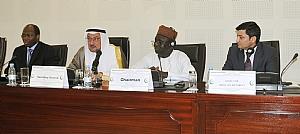4th Session of IPHRC Opens in Jeddah

Madani pointed to four challenges facing the Commission as it deliberates on human rights with an OIC perspective: limitations on freedom of expression, gender equality, applying human rights in accordance with the Member States constitutional and legal systems, and stopping the spread of extreme voices in the Member States.
The Secretary General stressed that the concern and care for human rights have been an integral part of the vision, charter and resolutions of the Organization of Islamic Cooperation (OIC) since its inception and birth.
He commended the Commission on its work in the area of Human Rights situation in Palestine and other occupied Arab territories; and on the issue of discrimination and intolerance against Muslims and on the issue of Rohingya Muslims in Myanmar. The Commission had established four working groups on: Palestine; Rights of Women and of the Child; Islamophobia and Muslims Minorities; and on the Right to Development. It also created an Adhoc Working Group to establish a proper framework for interaction between IPHRC and Member States’ accredited National Human Rights Institutions (NHRIs) and civil society organizations.
Moving forward, the Secretary General then spoke about the challenges facing the Commission as it deliberates on human rights with an OIC perspective. He said that one of the main challenges is to find an Islamic discourse that enriches the debate on human rights worldwide. With reference to the United Nations adopted the Universal Declaration on Human Rights (UDHR) and major UN human rights instruments, he pointed out that most OIC countries have willingly adopted and implemented international human rights norms. However, there are a number of issues that go beyond the normal scope of human rights and clash with Islamic teachings.
One of these issues is freedom of expression, considered as one of the fundamental freedoms and a sine-qua-non for the promotion and protection of human rights. “Despite repeated incidents of hatred and violence resulting from discrimination based on stereotyping and stigmatization of individuals, communities and religions, some countries continue to refuse any limitations or responsible use of this right,” said Madani. “Muslim countries enacting laws to ensure respect for the sanctity and reputation of religious values, scriptures and personalities for promotion of peace in society are criticized on account of limiting this freedom through blasphemy laws,” he added.
Another issue is gender equality and one of the main issues relating to gender equality debate is the very definition of term gender. While OIC countries prefer to use the notion of equality between men and women, Western countries push for the term Gender, which goes beyond the normal definition of men and woman into the direction of how one perceives him/herself rather than his/her actual physical appearance.
Another challenge that faces the Commission, said Madani, is that all references to human rights in the OIC documents stipulate that these principles should be applied in accordance with the Member States constitutional and legal systems. How to define this stipulations, and how to create a yard stick that each individual Member State can look at to measure the distance between the Islamic Human rights model and its own laws and practices.
And finally, Madani stressed that another important challenge is how to deprive the extreme voices in the Member States who hold the banner of Islam in spreading their extreme views, how to deprive them from their Islamic claim.
Source: OIC



